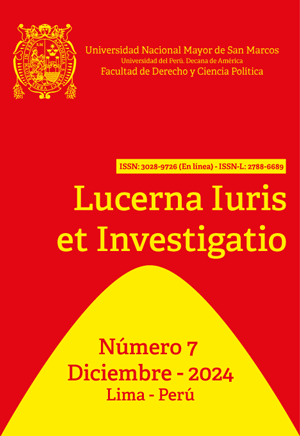Notes on the unchallengeability against the order that rejects the dismissal articulated by the accused in the intermediate stage. An approach from conventionality
DOI:
https://doi.org/10.15381/lucerna.n7.30314Keywords:
Criminal Process, Unchallengeability against the order denying the request for dismissal, control of conventionality, legislative reformAbstract
This paper examines the problem of the non-challengeability of the court ruling that rejects the request for dismissal made by the accused at the intermediate stage, which is provided for in the last lines of literal 4 of article 352° of the Criminal Procedure Code. Thus, the central point of these lines is to raise the viability of the challenge through appeal, for which we will highlight that what is regulated by the cited legal device does not conform to parameters of conventionality that judges must evaluate in each specific case. Likewise, for the construction of this article, the legal devices, doctrine and jurisprudence have been taken into account as inputs, in which the latter have addressed, as background, the thesis for and against, on the challenge to the order denying the request for dismissal. Therefore, it is proposed that appeals be allowed through a legislative reform for certain cases, so that the criminal process is not saturated by separate appeals.
Downloads
Published
Issue
Section
License
Copyright (c) 2024 Iván Gómez Carrasco

This work is licensed under a Creative Commons Attribution 4.0 International License.
THE AUTHORS RETAIN THEIR RIGHTS:
- The authors retain their rights to the work, trademark and patent, and also to any process or procedure described in the article.
- The authors retain the right to share, copy, distribute, execute and publicly communicate the article published in Lucerna Iuris et Investigatio (for example, place it in an institutional repository or publish it in a book), with an acknowledgment of its initial publication in Lucerna Iuris et Investigatio .
- The authors retain the right to make a subsequent publication of their work, to use the article or any part of it (for example: a compilation of their work, conference notes, thesis, or part of a book), provided that indicate the source of publication (authors of the work, journal, volume, number and date).






